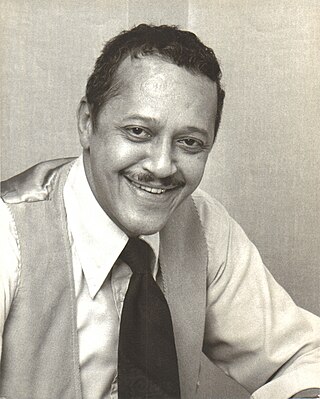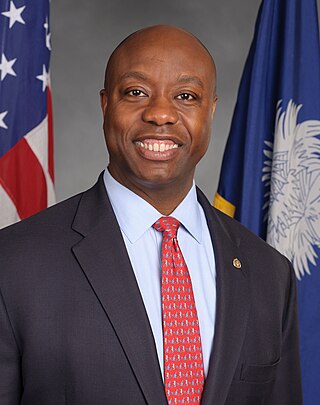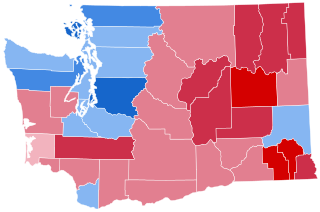
The Republican Party, also known as the GOP, is one of the two major contemporary political parties in the United States. It emerged as the main political rival of the Democratic Party in the mid-1850s.
American electoral politics have been dominated by successive pairs of major political parties since shortly after the founding of the republic of the United States. Since the 1850s, the two largest political parties have been the Democratic Party and the Republican Party—which together have won every United States presidential election since 1852 and controlled the United States Congress since at least 1856. Despite keeping the same names, the two parties have evolved in terms of ideologies, positions, and support bases over their long lifespans, in response to social, cultural, and economic developments—the Democratic Party being the left-of-center party since the time of the New Deal, and the Republican Party now being the right-of-center party.

The District of Columbia's at-large congressional district is a congressional district encompassing all of Washington, D.C., the capital city of the United States. Article One of the United States Constitution instructs that only "States" may be represented in the United States Congress. Because the District of Columbia does not meet that criterion, the member elected from the at-large district is not permitted to participate in votes on the floor of the House. Instead, constituents of the seat elect a non-voting delegate to the chamber. Though the delegate lacks full voting privileges, they are permitted to sit on, cast votes in, and chair congressional committees and subcommittees. The delegate may also join party caucuses, introduce legislation, and hire staff to assist with constituent services.

Walter Edward Fauntroy Jr. is an American pastor, civil rights activist, and politician who was a delegate to the United States House of Representatives and a candidate for the 1972 and 1976 Democratic presidential nominations as a favorite son.

John Andrew Boehner is a retired American politician who served as the 53rd speaker of the United States House of Representatives from 2011 to 2015. A member of the Republican Party, he served 13 terms as the U.S. representative for Ohio's 8th congressional district from 1991 to 2015. The district included several rural and suburban areas near Cincinnati and Dayton.
The Republican Party in the United States includes several factions, or wings. During the 19th century, Republican factions included the Half-Breeds, who supported civil service reform; the Radical Republicans, who advocated the immediate and total abolition of slavery, and later advocated civil rights for freed slaves during the Reconstruction era; and the Stalwarts, who supported machine politics.

The D.C. Statehood Green Party, known as the DC Statehood Party prior to 1999, is a green progressive political party in the District of Columbia. The party is the D.C. affiliate of the national Green Party but has traditionally elevated issues of District of Columbia statehood movement as its primary focus. Party members refer to the Statehood Green Party as the second most popular party in the District because, historically, STG candidates win the second highest vote totals in the city, ahead of the Republican Party but behind the Democratic Party. As of February 2023, there are approximately 4,140 voters registered in the Statehood Green Party, or 0.79% of registered voters in the city.

The Washington State Republican Party is the state affiliate of the national United States Republican Party, headquartered in Bellevue.
These are the references for further information regarding the history of the Republican Party in the U.S. since 1854.

The Republican Party, also known as the GOP, is one of the two major political parties in the United States. It is the second-oldest extant political party in the United States after its main political rival, the Democratic Party.

The District of Columbia holds general elections every two years to fill various D.C. government offices, including mayor, attorney general, members of the D.C. Council, members of the D.C. State Board of Education, and members of its Advisory Neighborhood Commissions. Special elections may be held to fill vacancies at other points in time. Additionally, citywide ballot measures may be proposed and voted on.

The District of Columbia Republican Party is the District of Columbia affiliate of the United States Republican Party. It was founded on June 19, 1855, and is made up of registered Republican voters living in Washington, D.C. elected to serve as the governing body of the Party. The party chairman is Jose Cunningham and the party is housed in the District of Columbia alongside the Republican Party national headquarters.

Channing Emery Phillips was an American minister, civil rights leader, and social activist based in Washington, D.C. In 1968, he was the first African American in history to be placed in nomination for president of the United States by a major political party.

The Lily-White Movement was an anti-black political movement within the Republican Party in the United States in the late 19th and early 20th centuries. It was a response to the political and socioeconomic gains made by African-Americans following the Civil War and the Thirteenth Amendment to the Constitution, which eliminated slavery and involuntary servitude.

Timothy Eugene Scott is an American businessman and politician serving as the junior United States senator from South Carolina since 2013. A member of the Republican Party, he previously served as a Charleston city councilor, a state representative, and a U.S. Representative. He also worked in financial services before entering politics.
Voter suppression in the United States consists of various legal and illegal efforts to prevent eligible citizens from exercising their right to vote. Such voter suppression efforts vary by state, local government, precinct, and election. Voter suppression has historically been used for racial, economic, gender, age and disability discrimination. After the American Civil War, all African-American men were granted voting rights, but poll taxes or language tests were used to limit and suppress the ability to register or cast a ballot. The Civil Rights Act of 1964 improved voting access significantly. Since the beginning of voter suppression efforts, proponents of these laws have cited concerns over electoral integrity as a justification for various restrictions and requirements, while opponents argue that these constitute bad faith given the lack of voter fraud evidence in the United States.

The 1956 United States presidential election in Virginia took place on November 6, 1956. Voters chose twelve representatives, or electors to the Electoral College, who voted for president and vice president. For the previous five decades Virginia had almost completely disenfranchised its black and poor white populations through the use of a cumulative poll tax and literacy tests. So restricted was suffrage in this period that it has been calculated that a third of Virginia's electorate during the first half of the twentieth century comprised state employees and officeholders.
The Socialist Workers Party of the District of Columbia is a minor political party in the District of Columbia The party advocates for statehood for the District of Columbia and ending Congressional control over the District's laws and finances. The party wants to abolish capitalism and replace it with a socialist economy.

The 2020 United States presidential election in Washington was held on Tuesday, November 3, 2020, as part of the 2020 United States presidential election in which all 50 U.S. states plus the District of Columbia participated. Washington voters chose electors to represent them in the Electoral College via a popular vote, pitting the Republican Party's nominee, incumbent President Donald Trump, and running mate Vice President Mike Pence against Democratic Party nominee, former Vice President Joe Biden, and his running mate California Senator Kamala Harris. Washington has 12 electoral votes in the Electoral College.

The Freedom to Vote Act, introduced as H.R. 1, is a bill in the United States Congress intended to expand voting rights, change campaign finance laws to reduce the influence of money in politics, ban partisan gerrymandering, and create new ethics rules for federal officeholders.














